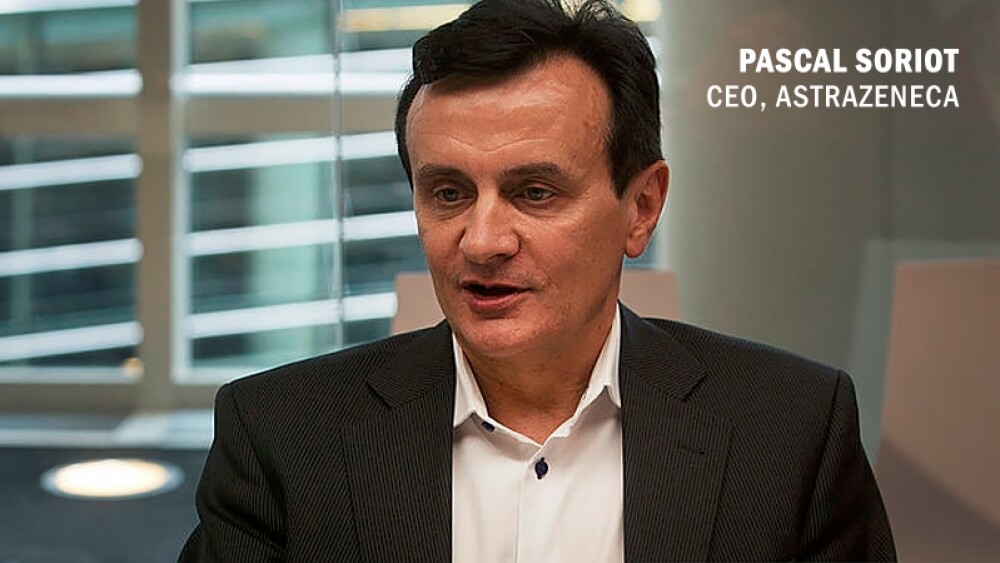October 11, 2017
By Mark Terry, BioSpace.com Breaking News Staff
When Pascal Soriot was offered the top spot at AstraZeneca in 2012, at least one friend told him it would be “suicidal.” The company has had its ups-and-downs since Soriot took over, but for the most part, Soriot appears to have been spot-on with his idea that, “They looked like they’d lost their way a little bit. There was an opportunity to make a difference and rebuild.”
Soriot, now 58, studied veterinary medicine near Paris, then earned an MBA. He worked with pharma companies in Australia and Japan before moving to Roche Holding AG , where in 2009 he headed first its biotech unit, then its pharma division. But Soriot reportedly didn’t believe he had a shot at the chief executive’s chair, so when AstraZeneca knocked at his door, he answered.
Shortly after taking the helm, he revived Lynparza, a cancer drug the company abandoned in 2011. It was a gamble that paid off, with the drug projected to generate around $1 billion in sales in 2020.
Perhaps the biggest gamble, however, was when Pfizer tried to buy the company for $117 billion in 2014, which at the time was a 45 percent premium over its stock price. Soriot turned it down and not all investors agreed. Many probably still disagree, with the current stock price below what Pfizer offered. Soriot, for his part, points to changes to the U.S. tax code that sank a deal between AbbVie and Shire about five months later. “We escaped a mess,” Soriot told Bloomberg Businessweek. He may be right. The U.S. government made similar changes to scuttle a deal between Pfizer and Allergan (AGN) in 2016.
In Soriot’s defense, over his tenure, shareholder returns have more than doubled. He has a stated goal of $41 billion in sales in 2023 compared to analyst projections of $33 billion. Soriot wants some time, at least through 2019, when some of his bets on new drugs will be realized—or not.
One of those gambles is on a clinical trial called Mystic, a combination of immune-therapies for lung cancer. The trial failed to prove it could slow tumor growth, which caused the stock to plunge last summer, although the stock had recovered since. “Wait a little longer and see what the share price will look like,” Soriot told Bloomberg. “This is biology and this is innovation—and innovation is risky.”
And success at this level always depends on a combination of risk and conservatism. If AstraZeneca and Soriot had played it safe since 2011, it’s questionable whether it’s stock would be doing as well as it is today. On the other hand, investors want good bets that reward handsomely, and it’s unclear if the hand Soriot’s playing now is as strong as he thinks it is.
“The pressure is rising,” says Bartjan van Hulten, founder of investment company Medex Capital in London, to Bloomberg. “Now he’s got to live up to the expectations he’s set.”
The Mystic trial is still ongoing, and another trial, Pacific, dazzled in early September. The trial showed that Imfinzi (durvalumab) showed a statistically-significant and clinically-meaningful improvement in PFS compared to the current standard of care in pages with locally-advanced (Stage III), unresectable non-small cell lung cancer (NSCLC) who had not progressed following standard platinum-based chemotherapy with radiation therapy. They also had a lower incidence of metastases than patients on placebo. It has the potential to add another $1 billion in annual sales for the company.
Only time will tell if Soriot’s grand goal will come through, but a string of strong pipeline successes would likely appease investors, even if he falls short of $41 billion, but exceeds the $33 billion Wall Street predicts. Some of it may be about managing expectations, and in that case, Soriot has backed himself into a corner.





